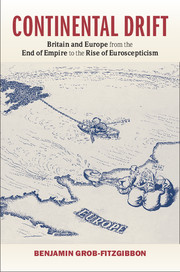Book contents
- Frontmatter
- Dedication
- Contents
- Acknowledgements
- List of abbreviations
- Introduction
- Part 1 Imperial Europeans
- 1 A world undone
- 2 Mr Churchill's Europe
- 3 Mr Bevin's response
- 4 The German problem
- 5 A disunited Europe?
- 6 The continental surprise and the fall of the Labour government
- 7 The realities of government
- 8 Perfidious Gaul
- 9 The decline and fall of the imperial Europeans
- Part 2 Post-imperial Eurosceptics
- Conclusion: Post-imperial Britain and the rise of Euroscepticism
- Notes
- Bibliography
- Index
2 - Mr Churchill's Europe
from Part 1 - Imperial Europeans
Published online by Cambridge University Press: 05 May 2016
- Frontmatter
- Dedication
- Contents
- Acknowledgements
- List of abbreviations
- Introduction
- Part 1 Imperial Europeans
- 1 A world undone
- 2 Mr Churchill's Europe
- 3 Mr Bevin's response
- 4 The German problem
- 5 A disunited Europe?
- 6 The continental surprise and the fall of the Labour government
- 7 The realities of government
- 8 Perfidious Gaul
- 9 The decline and fall of the imperial Europeans
- Part 2 Post-imperial Eurosceptics
- Conclusion: Post-imperial Britain and the rise of Euroscepticism
- Notes
- Bibliography
- Index
Summary
If Ernest Bevin felt bound by the heavy shackles of ministerial office, Winston Churchill was enjoying the freedom of opposition. He had, perhaps understandably, fallen into a deep depression after the General Election and although remaining as Conservative Party leader had spent more time at Chartwell, his family estate, than at Westminster. After a holiday to Italy, however, his spirits revived somewhat and, in November 1945, he travelled to France and Belgium. Speaking at the French Institute in Paris, Churchill gave the first hints of his vision for post-war Europe, hoping that ‘a new and happier Europe may one day raise its glory from the ruins we now see about us’ and, perhaps flattering his French audience, that ‘in this noble effort the genius, the culture and especially the power of France should play its true and incontestable role’.
Four days later, speaking to a Joint Meeting of the Belgian Senate and Chamber in Brussels, Churchill went further. The time had come, he said, for Europe to shed its violent past. He heralded his own ‘British island’, which had ‘repeatedly in the last four hundred years headed victorious coalitions against European tyrants’, for once again holding the ‘proud but awful responsibility of keeping the Flag of Freedom flying’. He spoke of Britain's ‘special associations’ – the British Empire, the Atlantic Alliance, and with Soviet Russia – and argued that they formed interlocking ‘circles’ under the umbrella of the United Nations, none prevailing over the other, and all coming together ‘in such a way to make it indivisible and invincible’. Given the tragedies of the two world wars and the destructive capabilities of the atomic bomb, the only possible path to peace was for all states to come together ‘under the guardianship of a world organisation’. Within this organisation, Churchill could see ‘no reason’ why ‘there should not arise the United States of Europe, which will unify this Continent in a manner never known since the fall of the Roman Empire’.
Leo Amery, a close friend of Churchill's since the Boer War, wrote to him immediately after the speech, saying that Britain could ‘give a real lead to Europe and the world in this matter’. For Amery to be moved in this way was significant, for he was a man known more for his ardent support of the Empire than for his sympathy with Europe.
- Type
- Chapter
- Information
- Continental DriftBritain and Europe from the End of Empire to the Rise of Euroscepticism, pp. 34 - 59Publisher: Cambridge University PressPrint publication year: 2016



